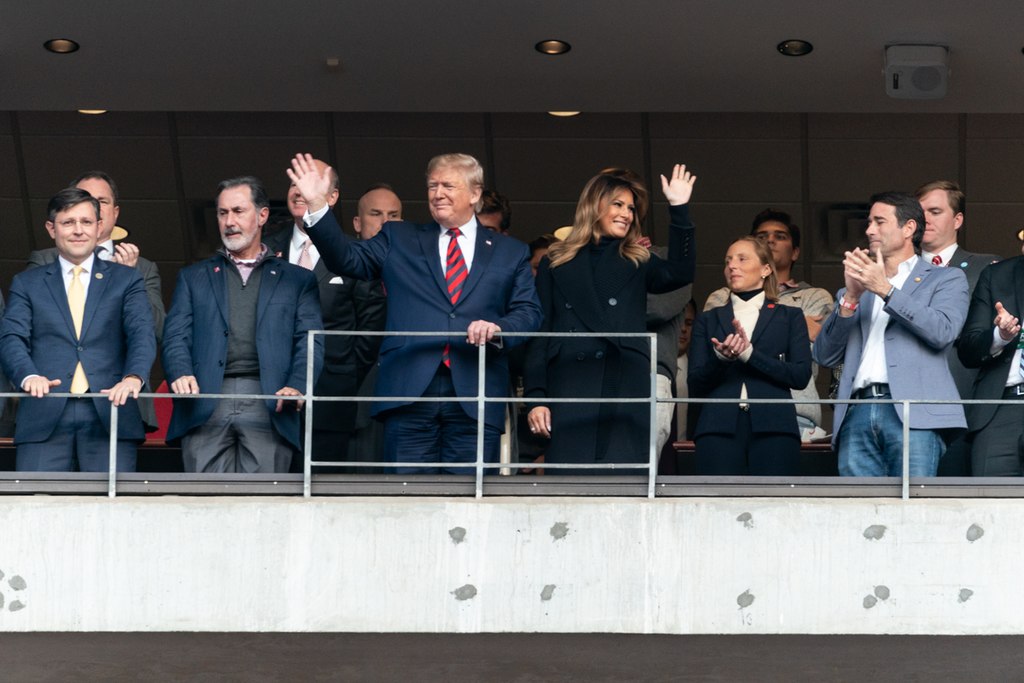Former President Donald Trump’s recent comments on military drafts and foreign involvement have ignited conversation across the political spectrum. In a public statement, Trump expressed his firm opposition to the potential for U.S. citizens to be sent to fight overseas, underscoring that he does not want “Americans’ children to be drafted and killed in a foreign country.” His words were direct and candid, striking a chord among Americans weary of prolonged military engagements abroad.
The former president’s remark, “We’re tired of fighting,” captured the attention of veterans, families, and political analysts alike, who see it as a departure from previous foreign policy stances. Trump, known for his “America First” agenda, is positioning himself once again as a voice against extensive foreign intervention. His message is gaining traction at a time when many Americans are voicing concerns about potential conflicts overseas, with particular anxieties surrounding tensions in the Middle East and Eastern Europe.
“We’ve been through enough,” Trump continued, reflecting on years of American military operations in regions like the Middle East, which, he argues, have drained resources, lives, and morale. “Our focus needs to be here, at home,” he said, reinforcing his long-standing belief in prioritizing domestic security and economic revitalization over international entanglements.
Trump’s comments have resonated strongly with families who fear the possibility of a renewed military draft. For some, the notion of their children being drawn into a distant conflict is reminiscent of the anxieties that surrounded past wars. His words have sparked a renewed debate over military conscription, which has not been utilized in the United States since the Vietnam War era but remains a topic of unease as global tensions rise.
Military experts and political analysts have taken note of Trump’s comments as indicative of his stance on future U.S. involvement in foreign disputes should he re-enter office. While some interpret his message as a commitment to peace, others worry it could signify a step back from global responsibilities and alliances. “Trump’s approach to foreign policy has always been unconventional,” said a political science professor at Georgetown University. “His words speak to an audience tired of America’s role as the global enforcer.”
For Trump’s base, however, his reluctance to engage in foreign conflicts is not seen as isolationist but rather as practical. “It’s about time someone spoke the truth,” shared one supporter online, noting that the U.S. has spent decades embroiled in costly international operations. “Our children shouldn’t be put on the line for battles that don’t directly protect our country.”
Meanwhile, critics argue that Trump’s statement lacks nuance, with some claiming it risks undermining longstanding alliances. They suggest that the former president’s approach could lead to a weakened U.S. presence on the world stage and embolden adversarial nations. Despite these concerns, Trump’s message has sparked discussion about the U.S.’s approach to foreign policy and the draft, an issue that resonates deeply with many families and veterans.
As the 2024 election approaches, Trump’s clear stand against sending American youth to fight in foreign wars may become a central theme of his campaign. His message of “we’re tired of fighting” has already made waves, reflecting a sentiment that is likely to continue influencing debates on America’s role in global conflicts.



 Failure of US-Iran talks was all-too predictable – but Trump could still have stuck with diplomacy over strikes
Failure of US-Iran talks was all-too predictable – but Trump could still have stuck with diplomacy over strikes  Argentina Tax Reform 2026: President Javier Milei Pushes Lower Taxes and Structural Changes
Argentina Tax Reform 2026: President Javier Milei Pushes Lower Taxes and Structural Changes  Does international law still matter? The strike on the girls’ school in Iran shows why we need it
Does international law still matter? The strike on the girls’ school in Iran shows why we need it  EU Urges Maximum Restraint in Iran Conflict Amid Fears of Regional Escalation and Oil Supply Disruption
EU Urges Maximum Restraint in Iran Conflict Amid Fears of Regional Escalation and Oil Supply Disruption  Trump Says U.S. Combat Operations in Iran Will Continue Until Objectives Are Met
Trump Says U.S. Combat Operations in Iran Will Continue Until Objectives Are Met  Australia Rules Out Military Involvement in Iran Conflict as Middle East Tensions Escalate
Australia Rules Out Military Involvement in Iran Conflict as Middle East Tensions Escalate  Marco Rubio to Brief Congress After U.S.-Israeli Strikes on Iran
Marco Rubio to Brief Congress After U.S.-Israeli Strikes on Iran  Russia Signals Openness to U.S. Security Guarantees for Ukraine at Geneva Peace Talks
Russia Signals Openness to U.S. Security Guarantees for Ukraine at Geneva Peace Talks  U.S.-Israel Strike on Iran Escalates Middle East Conflict, Trump Claims Khamenei Killed
U.S.-Israel Strike on Iran Escalates Middle East Conflict, Trump Claims Khamenei Killed  U.S. Deploys Tomahawks, B-2 Bombers, F-35 Jets and AI Tools in Operation Epic Fury Against Iran
U.S. Deploys Tomahawks, B-2 Bombers, F-35 Jets and AI Tools in Operation Epic Fury Against Iran  Trump Says U.S. Attacks on Iran Will Continue, Warns of More American Casualties
Trump Says U.S. Attacks on Iran Will Continue, Warns of More American Casualties  Suspected Drone Strike Hits RAF Akrotiri Base in Cyprus, Causing Limited Damage
Suspected Drone Strike Hits RAF Akrotiri Base in Cyprus, Causing Limited Damage  Trump Warns Iran as Gulf Conflict Disrupts Oil Markets and Global Trade
Trump Warns Iran as Gulf Conflict Disrupts Oil Markets and Global Trade  AI is already creeping into election campaigns. NZ’s rules aren’t ready
AI is already creeping into election campaigns. NZ’s rules aren’t ready  Why did Iran bomb Dubai? A Middle East expert explains the regional alliances at play
Why did Iran bomb Dubai? A Middle East expert explains the regional alliances at play  Netanyahu Suggests Iran’s Supreme Leader Khamenei May Have Been Killed in Israeli-U.S. Strikes
Netanyahu Suggests Iran’s Supreme Leader Khamenei May Have Been Killed in Israeli-U.S. Strikes  HHS Adds New Members to Vaccine Advisory Panel Amid Legal and Market Uncertainty
HHS Adds New Members to Vaccine Advisory Panel Amid Legal and Market Uncertainty 































